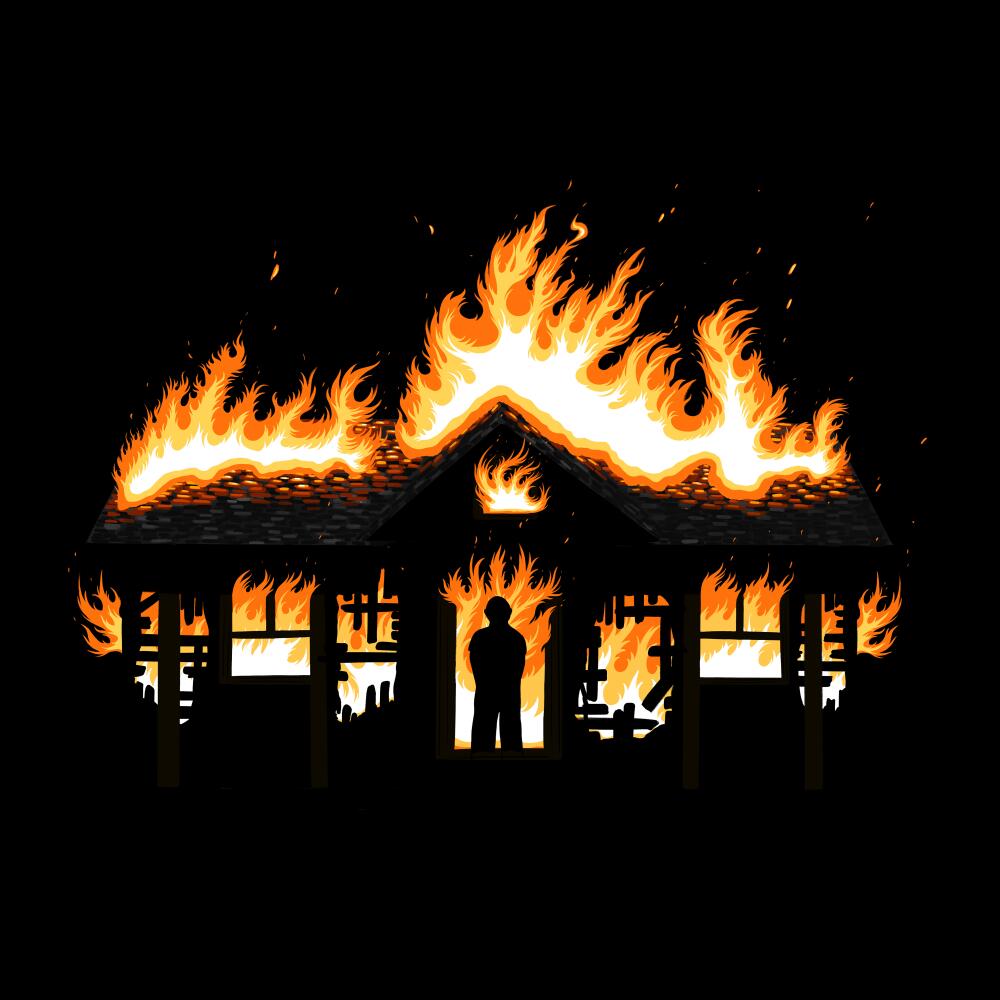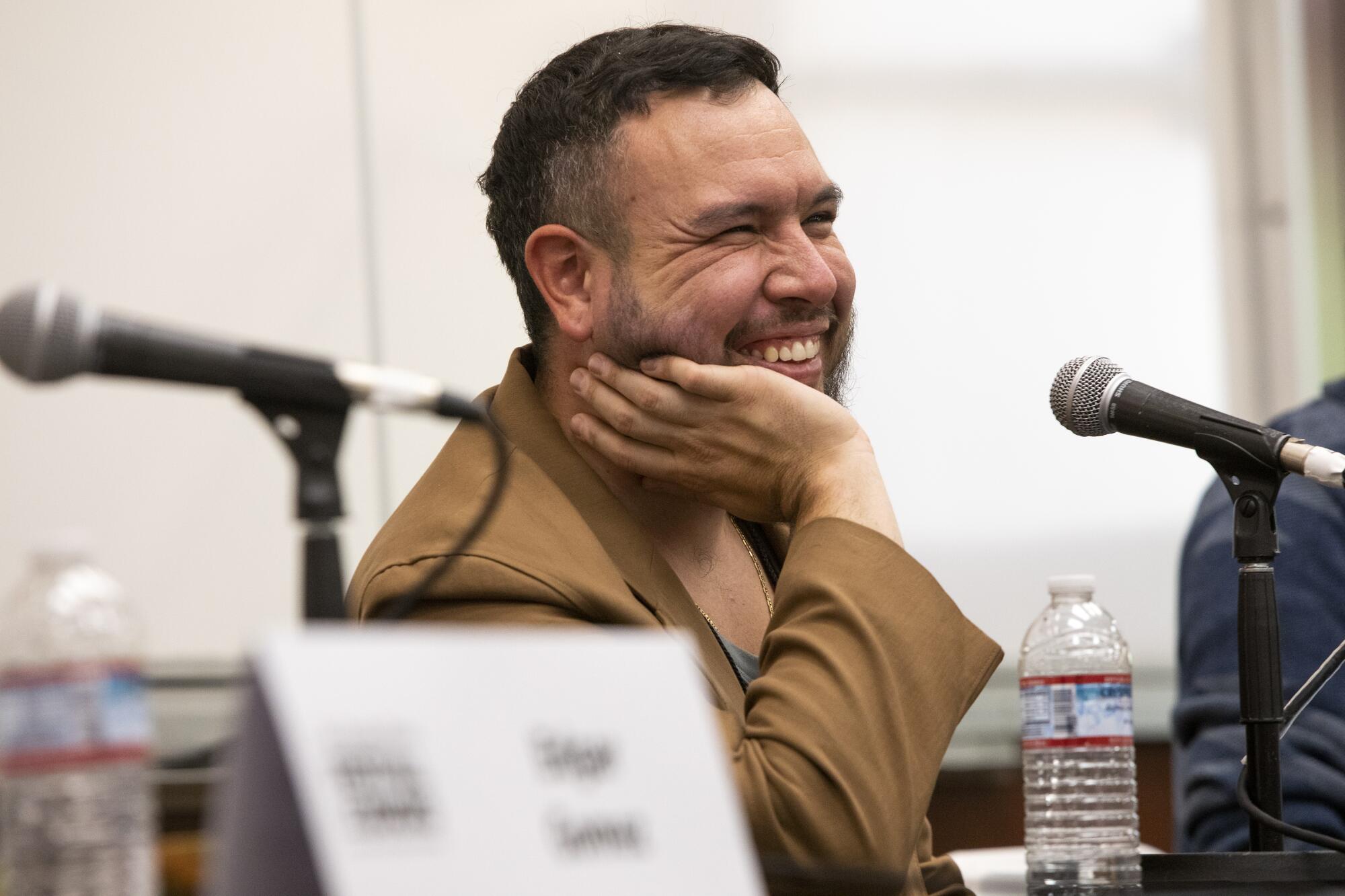
- Share via
“English lives in the throat,” Ignacio explained. “Spanish,” he framed his jaw with his hand and tilted his chin upward, “lives in the teeth.”
This would, he said, help with my pronunciation. I immediately liked the idea of languages having different homes in the body. I thought that might be why, whenever I spoke Spanish, some words would get caught on the way out of my mouth, their felled comrades replaced with stuttering “uh’s” and “ah’s.” I needed to move them up closer to my teeth, where they wouldn’t have to pass through the gluey marshes of English.
These locations, now that Ignacio had mentioned them, complemented my understanding of the languages. This was perhaps because the most prominent Spanish speaker in my life, my abuela, had been a severe woman eager to give people her tongue-lashings. Especially her husband, my abuelo. Chummy, she’d called him, because, as she’d frequently reminded us, she’d settled for him. She’d married her “chum.”
Spanish would naturally live right at the front of the mouth, words with restless, iridescent wings and stingers at the ready. “Which language,” I asked, “has the better house?”
“En español, por favor.”
“Claro, claro.”
An exploration of marketing terms like ‘200%’ and how that’s shaped our identity.
I was cooking us dinner in my Brooklyn apartment, the fee Ignacio and I had agreed upon for our lesson. He was a friend of mine, a journalist working in both languages. It was winter 2021. I lived alone, perhaps never more so than in those months. I was intent on perfecting my Spanish simply and only because it was something to do. I was proud of this fact; proud that I was pursuing fluency on my own terms.
I had only recently divorced the big idea of Spanish from what I’d come to think of as an affliction of diasporic narcissism. Symptoms included thinking there was such a thing as a “motherland” that called out for her estranged children, children charged at birth with the noble task of piecing together a personal history with a foreign place where people did things slightly better and with more self-assurance.
The Latinx experience chronicled
Get the Latinx Files newsletter for stories that capture the multitudes within our communities.
You may occasionally receive promotional content from the Los Angeles Times.
“To what end?” was the question that cured me. After years of doing what could generously be called culture writing, participating in panels, attending conferences, drafting columns and essays about growing up in a Mexican American household, I was beginning to lose interest. I was becoming jaded. It seemed to me that many identity-based projects required buying into certain fictions — borders, nations with their assumption of shared histories, umbrella terms for disparate groups — that were wildly brittle.
I was no longer interested in finding a home for myself anywhere in the haphazard structure of ethnicity, or in essentialist notions of cultural identity. If anything, I’d come to resent the constant jockeying for cultural credibility among my peers, the sanctimony and faux religiosity of capital “C” culture, the making of monuments out of mundane artifacts of your past, blowing up la chancla and VapoRub and loteria to sacred relic status. I thought that anyone who found a sense of self in such things was, at best, a bit dull. I was dull when I did it.
In short, I was content to be learning Spanish without approaching the process like it was part of a grand quest for belonging. I was not, I told myself, looking for Mexico, or looking for my abuela, or looking for myself, my cognate, in a language millions of people used every single day to buy fruit or argue with their cousins, among other quotidian activities.
I drew more inspiration from, of all things, an episode of “Killing Eve” I’d watched years ago, wherein Jodie Comer’s character, a sociopathic assassin and polyglot, said, “Language is information, and information is everything.” I liked this cool, detached approach. Spanish was just information. It wasn’t a mirror. It wasn’t something to reclaim. Me not speaking it perfectly wasn’t some kind of birth defect.

Get Involved
These are things I told myself as I prepared Ignacio’s plate, or plato, in Spanish and in italics, because how else was a reader to know that a word leads a different sort of life in a different, slightly sideways universe? Another nonsense practice, this time courtesy of the publishing industry, to roll my eyes at. I had an abundance of petty grievances along these lines that I wished I could do away with while trying to study.
[Editor’s note. De Los does not normally italicize Spanish words in our copy. We are doing it here to help prove a point.]
But they proved persistent, as did cloying questions related to language and identity, despite Jodie Comer’s best efforts to put them down.
::
It was nice, in those months that I took Spanish seriously, to organize my free time in service of something. My world swelled with teachers. Ignacio was one, as were the podcast hosts who spoke slowly and deliberately so that I could keep up, and so was Christian, a Colombian professor I’d hired as my tutor.
We met once in person, then agreed to hold our weekly meetings over Zoom. We quickly determined we had similar politics and taste in literature. He assigned me poetry and short stories to read and discuss. The poets were mostly tragic women, one of whom walked into the sea and drowned. The short stories were typically of the magical realism variety.
I particularly enjoyed the magical realism stories, which tended to involve characters going about their business while something absurd was happening near or around them. For example: A girl must deal with the reality of a wandering tiger in her house, a fact that is treated as rather banal. Fortunately, the tiger operates on a strict and reliable schedule, and its location among the rooms is always announced, and known.

Christian would, on occasion, ask me to tell him stories from my life in Spanish. Sometimes these focused on my day, what I’d had for breakfast, what I’d written about that afternoon, who I’d talked to over the phone, and so on. Other times, he’d ask me to fabricate something whole cloth, resulting in one tale wherein a massive, homophobic grizzly bear had been terribly rude to me at the coffee shop. I told him that I was ashamed to say I didn’t stick up for myself, not that it mattered, because the bear swiped my face off anyway. “That is why I come to you now with no nose, and no mouth.”
“You lead a fascinating life,” he’d said. “Even as you struggle against the preterite.”
Still other times, he’d ask about my family, which led to stories from my childhood, which inevitably made me a little sad. “My abuelos called each other slurs, but I didn’t know they were slurs,” I once said, thinking specifically of my abuelo calling my abuela “prieta” all my life, which for many years I heard as “Bretta,” a nickname that went unquestioned in the dream logic of early adolescence. It wasn’t until I’d mentioned this to a Mexican friend that I figured out what was going on. “Ah,” she’d said. Such things weren’t uncommon.
“My abuela called me fatso,” I offered another time. “I didn’t realize it until high school, when I learned what ‘panzón’ meant.” Not precisely true. It had been my abuela’s sister, Lupe, who’d said this to me, though me discovering its meaning in high school had been a fact. Not that it mattered. This little Zoom room wasn’t so unlike the magical realism stories Christian had assigned me. Reality was pliable here. The truth had freedom of form, so long as it was given shape in Spanish.
“Your abuela was an interesting woman. You talk about her a lot.”

“She was a big character.”
“Remind me where her family is from?”
“Chihuahua, Mexico. Both of them. My abuelos.”
“Can you describe them for me?”
I was harsher with them in Spanish than I was in English. A limited vocabulary made me blunt. I disclosed, among other things: They argued a lot. They weren’t super great to my mom. They made up a lot of stories about themselves, so it was hard to know the truth about anything. They gambled. They were poor. “Mis abuelos eran pobres.”
A wince. A protest from the English-speaking region of myself. Eran pobres. They were poors? It registered as taxonomical, locking them into their condition, denying them the decency or grace of the possibility of not being poor someday. Not the fault of Spanish. A personal interpretation of a misreading. But wasn’t language, any language, made up of many personal interpretations in uneasy collaboration with “the rules”? I was pretty sure a lot of middling poetry originated that way.
Becoming your family’s translator of what life is like in El Salvador and the realities of the U.S. takes a toll.
Either way, my abuela had died poor, and so would my abuelo, a fact that made me unhappy.
In addition to politics and literature, Christian shared with me a vigilance for small signs of discomfort in conversation. He dutifully changed the subject. “I’ve selected our story for next week,” he said. “By Carlos Fuentes. A Mexican author. We should read things from our culture when we can.”
Perhaps words didn’t have wings. Perhaps they didn’t live in designated neighborhoods in the body. Perhaps every word was itself a house. If so, then “we” is a particularly unstable one, as are its many iterations. Our. Culture. Community. Chicano. Hispanic. Latino. All words with holes in the roofs, their meanings shifting and shuffling anxiously underneath, waiting at any moment to flee to a better, sturdier residence.
Small wonder such words were so hotly contested, why arguments around them elicited such ferocious passion on all sides. People had housed important self-definitions in buildings that were at risk of falling over at the slightest tremor. It must have been the case for any language, language being an imperfect tool regardless of which collection of syllables arrange themselves into “home.”
I didn’t voice any of these thoughts to Christian. Not that I really would have been able to with the degree of precision I’d want. Not in Spanish, anyway.
::
Every word is a house. A house of meaning, private sentiments, information, faces.
I open the door of “Spanish,” not the language, but the word “Spanish,” to find a warm blanket. This is because, in my youth, Spanish was spoken slightly above and around me, enveloping me. When I imagine Spanish spoken in its steadiest, most unbroken form, I imagine a handful of early winter mornings in my abuelos’ creaky bungalow in Cache, Okla.
Why I slept there, especially on such bitterly cold nights, knowing they didn’t have reliable heating, is a mystery to me now. But we did sleep there sometimes, my sister, my cousins, and I, lying on the same foldout bed in their living room, the room with the wood-burning stove.
It was freezing in a wonderful way. The quilts, the stove, all of us in that room; warmth. I’d wake up so utterly protected, but with a cold nose. I’ll never forget that little brush of winter perched on the tip of my face, the fire in the belly of the wood-burning stove, Abuelo poking at it with a rolled-up newspaper, Abuela in the kitchen making breakfast, the din of pots and pans, the smell of tortillas.

They spoke to each other, my abuelos, thinking we were sleeping. They spoke in Spanish, but also in the casual, brusque language of adults with work to do. We were absconded from such concerns, from feeding fires and mouths. I was never so completely a child.
It was this house that I was struggling to depart from as I sought out a new articulation of myself, the house with its wooden porch with rotted beams that, when stepped on, warned they were days from retirement, the house with a shoestring where a doorknob should have been, the house with some of the creepiest crucifixes I’d ever seen hanging on bedroom walls, rooms that hadn’t seen use since my mom lived there; that house I think about so much, presently being emptied out as my abuelo moves into a nursing home.
I found the image of this house, unstable even in the physical sense, inescapable in my pursuit of fluency in Spanish. I thought of it as I guiltily described my abuelos by their shortcomings and by their struggles to Christian. I thought of my childhood. I wondered at what point in fluency I would be freed from such conjuring tricks. Illusions, after all, work most potently on the ignorant.
Illusions had led me to my personal crises, led to me imagining sentiment in social constructs that by their very nature were built on exclusion, and held no such thing for anyone. It was emotionally taxing to be studying a language and be so consistently interrupted by ghosts in haunted houses. I wanted to clear them out, to evacuate from the word “mijito” a stubborn little boy, looking for his grandparents. But, just as it sounds, such a process felt cruel.
::
I am preparing to say goodbye to my abuelo, who is very near death. “Goodbye” is what I would say, not “adios” or anything like that, though he’d accept either, I’m sure. I walked him out of the house the last time I was in Oklahoma. “I’m embarrassed,” he said, limping along, clinging to my arm. There’s not much beyond that for either of us to say. He’s hard of hearing and, mentally, he’s been checked out for a few years.
He’s so small now. He’s always been short, but never small, the kind of man who even when he was quite old would be working outside or moving furniture by himself. When I hug him goodbye, I do try to bring as much meaning into the hug as I can, wondering if this might be our last hug, but it falls short of its goal. It’s hard to imagine any hug accomplishing that sort of thing.
As I walked back inside I once again imagined his house, imagined myself, him, Abuela, my sister, my cousins, my mother and my aunt and my uncle in it. We are doing all the things we would have normally done in the house, only, the house is on fire. On occasion, we will repair what we absolutely must to keep the whole thing standing. But never more than that. The fire, for whatever reason, isn’t considered unusual or a problem.
Memories curl up and turn to ash and go away. I find myself understanding more and more the words my abuelos would say to each other, and the words are magic once again for a little while, transporting me back to childhood, but knowledge dulls their potency, and it’s not unlikely that soon they will lose this aspect altogether.
::
“En su opinión,” I asked Ignacio once more, trying as best I could to usher the words up to my teeth this time, “¿cuál de las dos lenguas tiene la mejor casa?”
John Paul Brammer is a columnist, author, illustrator and content creator based in Brooklyn. He is the author of ”Hola Papi: How to Come Out in a Walmart Parking Lot and Other Life Lessons” based on his successful advice column. He has written for outlets like the Guardian, NBC News and the Washington Post. He will write a weekly essay for De Los.
The Latinx experience chronicled
Get the Latinx Files newsletter for stories that capture the multitudes within our communities.
You may occasionally receive promotional content from the Los Angeles Times.
More to Read
The Latinx experience chronicled
Get the Latinx Files newsletter for stories that capture the multitudes within our communities.
You may occasionally receive promotional content from the Los Angeles Times.








